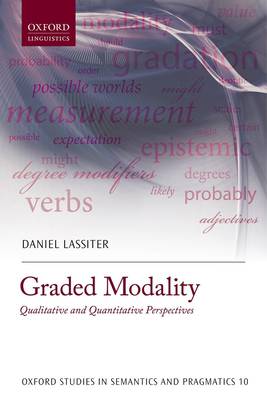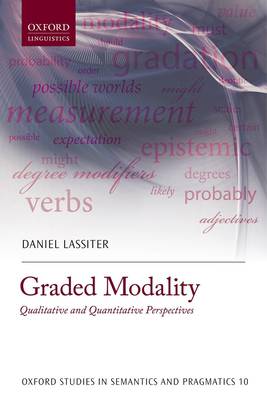
Door een staking bij bpost kan je online bestelling op dit moment iets langer onderweg zijn dan voorzien. Dringend iets nodig? Onze winkels ontvangen jou met open armen!
- Afhalen na 1 uur in een winkel met voorraad
- Gratis thuislevering in België vanaf € 30
- Ruim aanbod met 7 miljoen producten
Door een staking bij bpost kan je online bestelling op dit moment iets langer onderweg zijn dan voorzien. Dringend iets nodig? Onze winkels ontvangen jou met open armen!
- Afhalen na 1 uur in een winkel met voorraad
- Gratis thuislevering in België vanaf € 30
- Ruim aanbod met 7 miljoen producten
Zoeken
€ 60,95
+ 121 punten
Uitvoering
Omschrijving
This book explores graded expressions of modality, a rich and underexplored source of insight into modal semantics. Studies on modal language to date have largely focussed on a small and non-representative subset of expressions, namely modal auxiliaries such as must, might, and ought. Here, Daniel Lassiter argues that we should expand the conversation to include gradable modals such as more likely than, quite possible, and very good. He provides an introduction to qualitative and degree semantics for graded meaning, using the Representational Theory of Measurement to expose the complementarity between these apparently opposed perspectives on gradation. The volume explores and expands the typology of scales among English adjectives and uses the result to shed light on the meanings of a variety of epistemic and deontic modals. It also demonstrates that modality is deeply intertwined with probability and expected value, connecting modal semantics with the cognitive science of uncertainty and choice.
Specificaties
Betrokkenen
- Auteur(s):
- Uitgeverij:
Inhoud
- Aantal bladzijden:
- 296
- Taal:
- Engels
- Reeks:
Eigenschappen
- Productcode (EAN):
- 9780198701354
- Verschijningsdatum:
- 1/08/2017
- Uitvoering:
- Paperback
- Formaat:
- Trade paperback (VS)
- Afmetingen:
- 170 mm x 244 mm
- Gewicht:
- 544 g

Alleen bij Standaard Boekhandel
+ 121 punten op je klantenkaart van Standaard Boekhandel
Beoordelingen
We publiceren alleen reviews die voldoen aan de voorwaarden voor reviews. Bekijk onze voorwaarden voor reviews.











